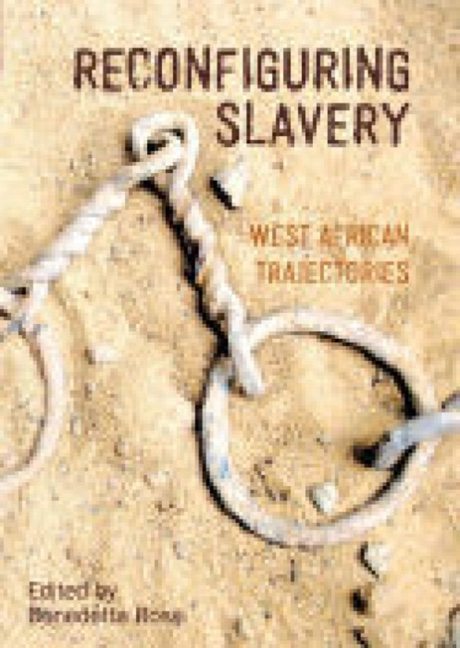Book contents
- Frontmatter
- Content
- List of Figures
- Notes on Contributors
- Preface
- A Note on Language
- Preface to the Second Edition
- 1 Introduction: Rethinking Slavery in West Africa
- 2 Slave Descent and Social Status in Sahara and Sudan
- 3 African American Psychologists, the Atlantic Slave Trade and Ghana: A History of the Present
- 4 After Abolition: Metaphors of Slavery in the Political History of the Gambia
- 5 Islamic Patronage and Republican Emancipation: The Slaves of the Almaami in the Senegal River Valley
- 6 Curse and Blessing: On Post-slavery Modes of Perception and Agency in Benin
- 7 Contemporary Trajectories of Slavery in Haalpulaar Society (Mauritania)
- 8 Slavery and Politics: Stigma, Decentralisation and Political Representation in Niger and Benin
- 9 Slavery and Migration: Social and Physical Mobility in Ader (Niger)
- 10 Discourses on Slavery: Reflections on Forty Years of Research
- Glossary of Foreign Words
- Index
8 - Slavery and Politics: Stigma, Decentralisation and Political Representation in Niger and Benin
- Frontmatter
- Content
- List of Figures
- Notes on Contributors
- Preface
- A Note on Language
- Preface to the Second Edition
- 1 Introduction: Rethinking Slavery in West Africa
- 2 Slave Descent and Social Status in Sahara and Sudan
- 3 African American Psychologists, the Atlantic Slave Trade and Ghana: A History of the Present
- 4 After Abolition: Metaphors of Slavery in the Political History of the Gambia
- 5 Islamic Patronage and Republican Emancipation: The Slaves of the Almaami in the Senegal River Valley
- 6 Curse and Blessing: On Post-slavery Modes of Perception and Agency in Benin
- 7 Contemporary Trajectories of Slavery in Haalpulaar Society (Mauritania)
- 8 Slavery and Politics: Stigma, Decentralisation and Political Representation in Niger and Benin
- 9 Slavery and Migration: Social and Physical Mobility in Ader (Niger)
- 10 Discourses on Slavery: Reflections on Forty Years of Research
- Glossary of Foreign Words
- Index
Summary
In pre-colonial African societies, access to village spaces and ‘spaces of sovereignty’ was determined by sex (men rather than women), age (older rather than younger) and social status (free men rather than slaves), and not by egalitarian principles (Olivier de Sardan, 1994). Colonialism profoundly altered pre-existing forms of governance. However, it did not call into question considerations relative to ‘political adulthood’ (Olivier de Sardan, 1994, 120), which continued to set the rules of competition in local political arenas even after independence and successive waves of democratisation. In spite of numerous regime changes, women, young men and descendants of slaves remained politically marginal.
From the beginning of the 1990s, donor-led decentralisation appeared to both scholars and activists as the best way to promote democratisation ‘from the bottom’ (Wunsch and Olowu, 1990). Democratisation was presented as a cure to all the ills suffered by centralised African states. It was supposed to increase respect for human rights, to promote ‘good governance’, transparency and accountability (and thus stimulate the efficient management of public resources), to stimulate popular participation in development and to empower the most destitute and marginalised groups. Decentralisation, initiated from the exterior and taken up by internal forces (e.g. the case of Tuareg revolts in Niger and Mali), was eventually implemented by African governments. In the case of Benin and Niger, the reforms announced at national conferences from the beginning of the 1990s were not implemented until 2002–2003 and 2004, respectively. In both countries, groups of former slaves, until then politically marginalised and stigmatised, took advantage of the opportunities created by decentralisation to access political power at the local level.
Based on fieldwork conducted in Benin and Niger between 2002 and 2007, this essay compares the processes of political emancipation followed by different groups of slave descent. In all of the three groups discussed in this chapter, slave descendants outnumber the descendants of old elites. While in the Songhay context the aristocracy has maintained its privileges and political power locally, former Tuareg and Peul slaves were able to take over municipal councils. However, this renewal of leadership did not lead to major transformations in the management of local affairs.
- Type
- Chapter
- Information
- Reconfiguring SlaveryWest African Trajectories, pp. 152 - 181Publisher: Liverpool University PressPrint publication year: 2009



